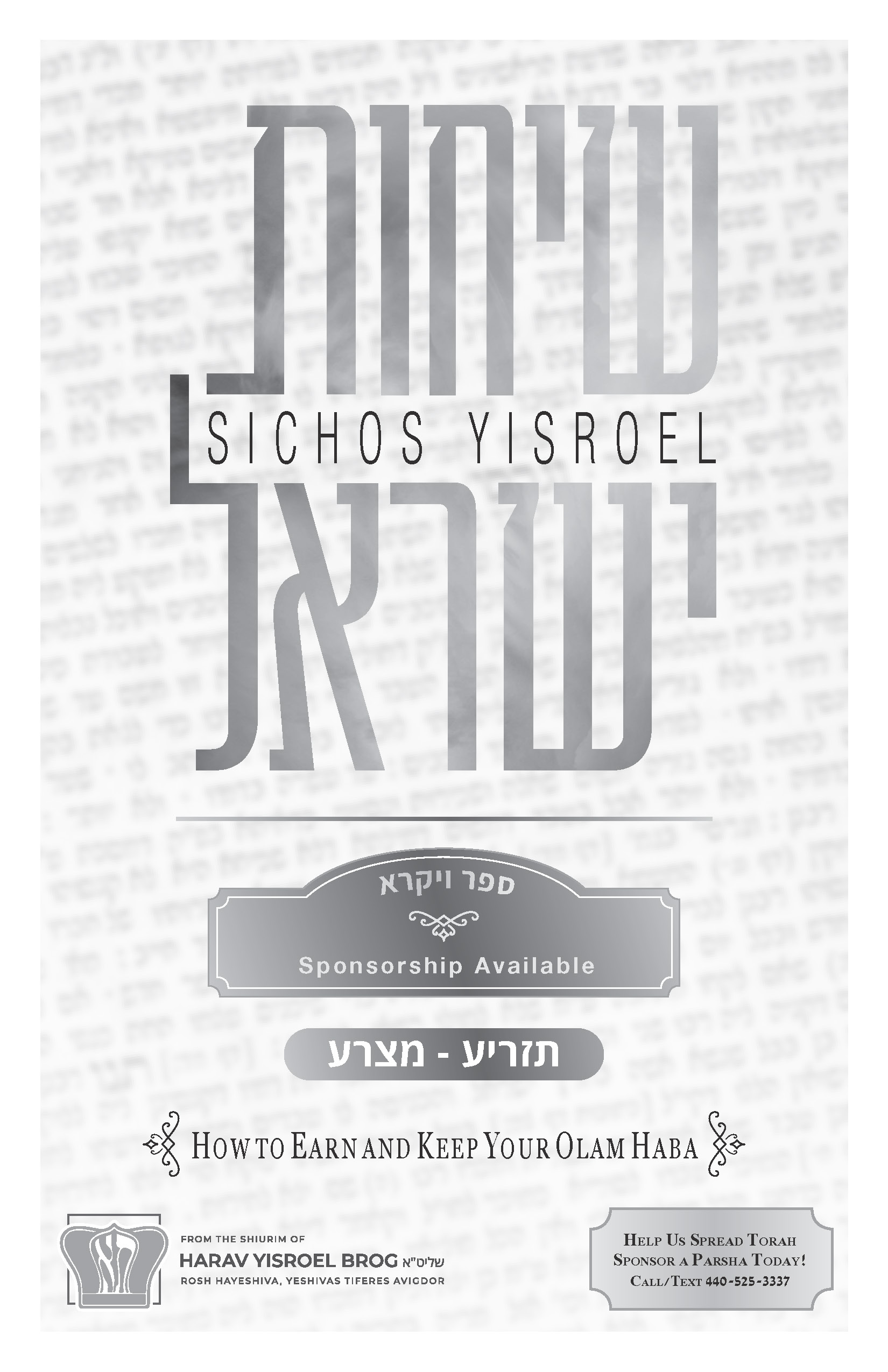Nasso 5783: Concealing and Controlling Our True Middos
Sponsored
לעילוי יצחק מאיר בן לב בלוי
Consider sponsoring a shiur
Visit YTATorah.org
Shiur presented in 5778
The Effect of Seeing A Sotah
We’re coming down from the mountain. Shavuos is over. You know, there is one maalah of Yom Tov over Shabbos. The Ramban says that the neshamah yeseirah of Shabbos leaves by Motzei Shabbos. By Yom Tov, it doesn’t leave. But lema’aseh, after matan Torah, you know what Hashem said? שׁוּבוּ לָכֶם לְאָהֳלֵיכֶם, “Go back to your tents” (Devarim 5:27). Go home. Do you know what Hashem wanted us to do? To take the Torah we just learned, take the Torah we were just mekabel, and bring it home.
In Parshas Naso, the Torah talks about a nazir. The pasuk says: ‘אִישׁ אוֹ אִשָּׁה כִּי יַפְלִא לִנְדֹּר נֶדֶר נָזִיר לְהַזִּיר לַה (Bamidbar 6:2). Now, this parshah of nazir follows the parshah of sotah. It would seem that there were no more polar extreme parshiyos than these two. Sotah deals with the weakness of people, it deals with matters of arayos, matters of tumah. And the latter, nazir, deals with inyanei kedushah and prishus. So what is the smichus (connection of) haparshiyos? Chazal sometimes ask this question, especially when it looks like it doesn’t shtim. And when you have two polar extreme opposites following each other, there is some kind of subliminal message that the Torah is trying to instruct us with.
And Chazal, brought down in Rashi, answer: לוֹמַר לְךָ שֶׁכָּל הָרוֹאֶה סוֹטָה בְקִלְקוּלָהּ, to tell you that anyone who sees a sotah bekilkulah – which means he sees a sotah after she was already caught, after she was already hauled before the court and she insisted in denial and they took her to Yerushalayim and subjected her to all kind of bizyonos in front of the multitudes – you know what the person who witnesses such a thing should do? יַזִּיר עַצְמוֹ מִן הַיַּיִן, he should separate himself from drinking wine. Why? שֶׁהוּא מֵבִיא לִידֵי נִאוּף, because it brings a person to niuf (immorality). The shtiyas yayin (wine) causes kalus rosh, lightheadedness, the ability to make good judgments and discern between right and wrong becomes weakened, so therefore יַזִּיר עַצְמוֹ מִן הַיַּיִן.
Now, this is something we have to think about because the Torah is giving us very mighty instructions. It’s telling us: “Whoever sees a sotah bekilkulah, is being forewarned and put into a matzav of challenge.” That is what you have to know. Now, when the sotah gets bizyonos, it’s not what you would call a romantic situation. She is put down, she is humiliated, and so on and so forth. I would think if you witnessed such an event, you have nothing to worry about. That is the biggest mussar shmuz that you can get. Farkert. I could understand if the gemara says, if you see a sotah daintily walking down the street and smiling at everybody and everybody knows she’s a sotah, okay. Then people would think, “It looks like she got away with it.” But when you see such a matzav, what is there to worry about?
The Torah tells us a revelation about a human being. Every human being is so twisted that if he sees such a situation – it doesn’t make a difference if he’s a katan, a teenager, a yungerman, a rosh yeshivah – every single person, you should know, is susceptible to seeing something and when you see something, even what would appear to be a davar maus, something detestable, the way a person’s mind works is such that he’s got to now put up an extra shemirah to prevent himself from falling into the trap of arayus. Hashem wants you to know, you’ve been forewarned. And this is something that is mind boggling.
Seeing is Believing – So Be Forewarned
I heard this from my rebbi (Rav Meir Halevi Soloveichik) in the name of his father, the Brisker Rav, that there was this most disgusting form of avodah zarah which I can’t imagine. You got in line for this avodah zarah. It was a little avodah zarah. You paid good money to get a shot. They sold you diuretics to make you have serious shilshul quickly and you got on line, you took a ticket and they called your number. They gave you the shot to drink. They told you to stand on the side, they are going to call you soon. You step up to this mess, this little getchke there. They tell you to relieve yourself on this getchke. Yeuch. I mean, just the place alone. I could almost vomit just thinking about it. And people want to get in line. And one of the last warnings that Moshe Rabeinu gives Klal Yisrael before he departs, he said, “I’m telling you, you’d better not do this stuff.” It’s almost unbelievable that Moshe Rabeinu said that to Klal Yisrael. “Rebbe, I know we had a couple of mistakes there. We got stuck with this, we got stuck with that, but this? I mean, this is disgusting.” And the Brisker Rav said, וַתִּרְאוּ אֶת שִׁקּוּצֵיהֶם וְאֵת גִּלֻּלֵיהֶם, “you have seen these detestable things with your eyes” (Devarim 29:16). If you didn’t see it, I wouldn’t have to tell you about it. But if you saw such disgusting things – your eyes beheld it – it doesn’t make a difference who you are. You are automatically desensitized and you are automatically now open to thinking, “It can’t be all that bad. Not everybody is a meshugene. And they smile when they go in and they smile when they come out. Alle kuken ois tzufrieden (everyone looks happy). So it can’t be that bad.” You figure, they must hose the place down after it. This is such an important lesson.
Protect Ruchnius to Avoid Becoming Desensitized
I remember, I was once staying in a brand new hotel that opened up right outside the Old City, called the Dan Pearl. It has since been closed. I told my Rebbi (Rav Meir Halevi Soloveichik) that I was staying there. He said, “Nu, vos is dos?” So I told him, “It’s a very nice place.” So he told me, “When you look out of your window, what do you see?” I told him, “I can see the wall of Yerushalayim.” He said, “Don’t look out the window.” I said, “Why?” He said, “Ich shtell zich – I imagine that on the inside of the wall there is a church. An Armenian church or a Greek Orthodox church, I forgot which one it is. And when you stand and look out of your window and look at the wall, over the top of the wall there is a cross sticking out. Kook nisht (don’t look).” He said it with the most serious tone. I can’t tell you how serious he sounded. “Don’t let your eyes be laid on that sight,” he said. I told him, “I’m looking at the wall.” He said, “Nein, nein, nein. Your eyes will creep up the wall. Nisht kooken.” I said, “Is it that bad? In America, it’s something you always see.” He told me not to look because it has a groise hashpaa (bit impact).
We don’t understand what that sight does to us. It doesn’t look so bad. How could it be bad? It’s just a piece of wood, this way, that way, shesi ve’erev. Could that be so bad? How could it be so bad? But I remember he said, “Don’t look!”
Then I read a similar story with R’ Baruch Ber Lebowitz (1862-1939) when he walked with his mother in Europe and every time they passed one of these places, she would put her hands over his eyes so he wouldn’t see. It could make a roshem.
Now, this is if a guy sees a sotah bekilkulah. What if the guy sees something really awful on his phone? What if the guy sees something seriously awful on a screen? Everybody thinks that he’s not going to be desensitized. Everybody thinks: “Na, nisht geferlach” (it’s not so bad). You know what I mean? It’s just curiosity. You have to know that a person changes himself with one reiya.
And if you see a sotah experiencing a kilkul, the Torah tells you: יַזִּיר עַצְמוֹ מִן הַיַּיִן! Even though you see she’s getting humiliated, embarrassed and shamed, and your heart goes out for her – it’s rachmanus! They didn’t catch her in the act 100%, it’s only a chashash; they don’t know for sure. That’s what the water tests for. But you have to know that this is how it is, rabosai. And people don’t realize that from seeing something one time in their life, they become desensitized.
It’s like driving under the influence. If you’ve ever driven under the influence, you know what you think? “It’s not that bad. It’s not all they make it out to be.” Well, of course, a guy who is toit shikur, he can’t drive. He doesn’t know which door to go into. He goes over to a truck and starts shaking the wheels, thinking the tire is the steering wheel. But if the guy knows where the door is and how to put the car on and actually begins driving, it’s a disaster. He doesn’t realize it. You know what happens? He can’t tell distances. He can’t see – the turns aren’t the same. His whole intellect becomes skewed and everything looks a little fuzzy. Even though to the sechel of the person, it doesn’t look like that. He does not perceive there is anything wrong with how he understands the matzav.
He’s Afraid of Having a Little Drink
R’ Yerucham Levovitz (1873-1936) was once sitting by a Yom Tov gathering in an idonsimcha, a time of simchah. And he was sitting next to a tzaddik, a big baal mussar. And they were having some lechaims and they were drinking some whiskey lekavod Yom Tov. And he wasn’t taking any. So R’ Yerucham asked him, “What is the pshat? Why don’t you drink a bissel lekavod Yom Tov, simchas Yom Tov?” So he didn’t tell R’ Yerucham that the din shtias yayin iz nisht oif yayin saraf (“Drinking wine does not include drinking hard drinks like whiskey”). He didn’t tell him that. You know what he told him? “Ich hob moira tzu trinken.” That’s what he said. “I’m afraid to drink.”
Now, we’re not talking about drinking a whole bottle. I guarantee this person was not a member of AA, Alcoholics Anonymous. He was afraid to drink a little bit of whiskey. What was the pshat? The gemara says in Eiruvin (65b): בִּשְׁלֹשָׁה דְּבָרִים אָדָם נִיכָּר – you want to know who a person is? Beshlosho devarim. In these three things: בְּכוֹסוֹ, וּבְכִיסוֹ וּבְכַעְסוֹ – with his cup, with his pocket, and with his anger.
That means, if a person drinks and he gets a little buzzed, that buzz causes the person to reveal himself. You want to know who a person is? See how a person shares his money with the needy or spends his money on mitzvos. And bekaaso means to see how a person acts when he gets buzzed.
Now, you have to know, R’ Yerucham says in a certain place that if you want to get an idea of what a person is really like, observe them when they have bad middos. What middos does a person have? So he says, each animal represents certain bad middos, especially beheimos temeios. Which bad middos does a human being represent? Is it the middah of the lion? Is it the middos ra’os of a davar acher? Which middos? The answer is: the middos of the entire zoo! That’s what he says. You are a walking zoo! Not the biblical zoo. The Brog zoo. The zoo with all the animals. That’s what every person is. Every person has those middos hiding within himself.
We May Look Good on the Outside, But…
Chazal tell us in a midrash (Bamidbar Rabbah 20:6) about three great tzaddikim Hashem tested to see what they were about.[i] מִשְׁלשָׁה בְּנֵי אָדָם שֶׁבְּדָקָן הַקָּדוֹשׁ בָּרוּךְ הוּא וּמָצָא קָרוֹן שֶׁל מֵי רַגְלַיִם. And you know what he found them to be? He found them to be a קָרוֹן שֶׁל מֵי רַגְלַיִם, a “bucket of urine.” That’s interesting. We’re talking about very, very big people! One of them was Chizkiyahu Hamelech who was almost ra’oy to be Mashiach except for one little incident! And it doesn’t say he had a little shmutz on his pants. Hashem said that he was comparable to a kiton, a whole pitcher of mei raglayim! Nu?
So when R’ Yerucham said this shmuz over to the oilam, he said, “You should forgive me, but you know what you are like then? A covered up beis hakisei. A beis hakisei mechusa.” That’s what a mentch is. He said, “If a person who knows himself understands that he would know where to begin working on himself.
But there are different types of beis hakiseis, he says. There are private beis hakiseis, and there are public ones. (In his day, the way they used to have the beis hakiseis in the city, was in the center of the place. My zeide (Rav Avigdor Miller) said that in Slabodka, there was no bathroom. When they built the new building of Slabodka – I can’t imagine it – they didn’t build bathrooms. To go to the bathroom, you had to walk 15 minutes. And when you came out of that bathroom, my grandfather said, it took 20 minutes to get the smell out of your clothes. You had to walk around the street pashut to get the smell out of your clothes. It was a place you really didn’t want to go. My zeide was a big mefunak. I don’t know how he ever went to that bathroom. I don’t know how he lasted in Slabodka for seven years! And there was no flushing. Yidden, goyim, zekeinim, ktanim, everybody went to the same place.)
So from the outside, you look at the building, it looks like a proper building. Nice big windows. It wasn’t a hovel, it wasn’t a tent. It wasn’t a porta potty. The public outhouse was a real building, from the outside. And all of a sudden, you walk into it and you see nothing but excrement. R’ Yerucham says, dos is a mentch. A mentch looks like a binyan mefuar, a gantze gavra raba over here, from the outside. There is a maamar hachacham, R’ Yerucham said. A chacham said, “If anybody would be able to smell my sins, everybody would flee from me in a very big hurry.” Now, when a person covers himself up, you know what he thinks? He thinks that he’s a mentch, a nice person. He even puts a smile on. He even says a shalom aleichem. How does that ad go? “Are you afraid to give your hand to the rav? Are you sunk into the tumah of the internet? Are you ashamed to give your rav a good Shabbos?”
Kiton shel mei raglayim, he says, would be a kind description. When this person said to R’ Yerucham, “I’m afraid to drink,” he was saying that “I’m afraid that maybe my cover will be blown and the real me will be revealed. Do you understand this?
Now, a person has to know the emes, because if you don’t know the emes of what you are really all about, then how can you work on yourself.
I can’t tell you how many people I’ve spoken to in the world, that I was mamash shocked out of my kishkes. The stuff that they would reveal to me was unbelievable. And all it tells me is, that’s what a mentch is deep inside.
Seeing A Sotah Is Enough to Activate Inner Weaknesses
Now, a person who knows himself tries very hard to keep himself under wraps. He tries to make sure that the door of his ‘beis hakisei’ is always shut and locked. But once in a while, that’s what happens. The gemara (Brachos 28b) says: תֵּדְעוּ כְּשֶׁאָדָם עוֹבֵר עֲבֵירָה אוֹמֵר שֶׁלֹּא יִרְאַנִי אָדָם – Know that when one commits a transgression, he says to himself: ‘I hope that no man will see me.’ (i.e. if one was as concerned about avoiding shame before Hashem as he was before man, he would never ever sin.)[ii] A person is concerned. When he does an aveirah, he doesn’t want people to see him. So the Torah tells us, you want to know what is going to open up your door and blow your “cover”? If you see a sotah bekilkulah. The person will compromise his natural ability to control himself.
A number of years ago, a yungerman once came to me. He was a working fellow. He told me that he had committed a terrible chet. He felt awful. He mamash felt so mevuyash and he couldn’t come tzu zich. So I told him, “I want you to know something. What you have to do is teshuvah. But you also need a shemirah me’ula (extra protection). What you were able to get away with yesterday and what somebody else might be able to do, you could never do again. Because once you’ve been compromised, once you were nichshol, you’re finished.” He told me, “I’m never going to do this again.” I said, “From your mouth to Hashem’s ears, and I wish it will be so. But you know what the Torah teaches us? That once you were nichshol, your lock is broken.” I told him, “Be meschazek in Yiddishkeit.” His Yiddishkeit was shvach too. He let himself go in a lot of areas. He was mechazek himself. A few years went by.
Not long ago, I had the opportunity to speak to him again. I didn’t know if he remembered that he told me what he did a few years ago. People have a powerful koach of shikcha (forgetfulness). I told the guy, “By looking at your face, I see you’re not clean anymore.” I said, “I see you’re on drugs.” He told me, “No, no, I don’t do drugs.” I said, “I’m talking about the drugs you smoke. I’m talking about the drugs that people are nichshol bahem (“fall into”). The ‘roieh sotah bekilkulah’ type of drugs.” He told me, “Today it’s so beyond, naasis lo keheter. It’s already mehadrin min hamehadrin.” I said, “Are you out of your mind?” I remember him clearly telling me a few years before this, of how tzubrochen he was. I mamash felt bad for the guy, that he failed and messed up so badly.
A person has to know that in these matzavim, kiso, koso and b’kaaso, a person removes the “cover” that he’s always walking around with. You meet people who mamash look like such feiner mentchen (fine people). But then you give the guy a scratch with a fingernail, and the guy will bite your finger off and your toes off and the guy will come out to be a beheimah gasah. What’s pshat?
You have to know, the whole Torah is like the parshah of nazir. The Torah is trying to be mechanech us and guide us how to make sure we don’t introduce into yourselves, into our lives, the זְבוּבֵי מָוֶת. The passuk in Koheles (10:1) says: זְבוּבֵי מָוֶת יַבְאִישׁ יַבִּיעַ שֶׁמֶן רוֹקֵחַ יָקָר מֵחָכְמָה מִכָּבוֹד סִכְלוּת מְעָט, “Dead flies turn the perfumer’s ointment fetid and putrid; so a little folly outweighs massive wisdom.” Dead flies can make the best quality shemen rancid. יַבִּיעַ שֶׁמֶן רוֹקֵחַ. Once you reveal your “true” middos, that’s what happens.
People think today, “Nothing is going to affect me. Neh, I’m not the type of guy, not the type of person.” Ladies are also susceptible to this, by the way, as it says: כאיש ואשה (Bikkurim 4:4). People think they are not susceptible. Everybody is susceptible. That is what a person has to know.
Why Aren’t Middos Found in the Torah Itself?
Now the velt asks a famous question. How come it doesn’t say anything about middos in the Torah? That’s the famous question.
So the Alter from Kelm (R’ Simcha Zisel Ziv, 1824-1898) once explained that the middos of ka’as and jealousy and all these other middos, are very, very fundamental. The Torah doesn’t make a big fuss about them. Why not? The whole person runs on his middos. All of your behavior rests on your middos. See, what happens is, when a person is exposed to negative things, the place that it gets him in is his middos. He becomes weak in his middos. So the Alter from Kelm said over a very nice mashal.
He said, could you imagine, a guy comes to a professional tailor with a piece of cloth and he says, “Here is the cloth. I’d like you to make me a custom suit.” And he tells him what he would like to have. Nu, the tailor says, “Fine, okay.” He writes his name down, gives him a paper, tells him when to come back for the first fitting. Zei gezunt. What if the guy will tell him now, “Now remember, take the needle, thread the needle – you know how you thread the needle? And when you’re holding the needle, hold the needle with the point facing the garment.” And he starts telling him all these silly rules that are dvarim pshutim to a master tailor. What’s the guy going to tell him? He’s going to take him and throw him out of the shop. “I’m a master tailor! You’re telling me what to do?! You’re telling me how to hold my needles, how to thread the needles? How to tear the cloth? You think I don’t know that?!”
So the Alter of Kelm said that when Hashem gave us the Torah and gave us this melachah and taught us what the Torah was about – at that point, people understood it. They became a nation of מַמְלֶכֶת כֹּהֲנִים וְגוֹי קָדוֹשׁ (Shemos 19:6). So they became fully aware of all of the middos that are required in order to live up to this credo of: מַמְלֶכֶת כֹּהֲנִים וְגוֹי קָדוֹשׁ. They understood that if you have ka’as, you can’t be a mamleches kohanim vegoi kadosh. If you have gaavah, you can’t be a mamleches kohanim vegoi kadosh. With middos ra’ois, it’s not shayach to be and retain your status of mamleches kohanim vegoi kadosh. Once Klal Yisrael said, כֹּל אֲשֶׁר דִּבֶּר ה’ נַעֲשֶׂה (Shemos 24:7) they were mekabel upon themselves to live up to this job of being a Yid and to live as Yidden and to be mekayem the Torah and the mitzvos. It was a davar pashut. So telling a person, “Don’t have bad middos,” is like telling the tailor, “Don’t try to sew the garment with a fork.” Farshteisach. It’s so obvious, it doesn’t have to be even mentioned! There is not one din, not one of the mitzvas haTorah that is not relevant to middos. Everything rests on that. That is what it is.
Every Mitzvah Is There to Perfect a Middah
It’s self-understood, says the Alter from Kelm. It’s a davar pashut. When somebody is given the task to learn Torah, he now has to ask himself, “What do I need? What kind of behavior, character traits, and attributes do I have to acquire in order to get to this point in life, in order to be able to do that?” All the mitzvos refine a person. That refinement lies within the mitzvah itself. Hashem says: “Do chessed, do tzedakah, have emunah, etc.” Emunah breaks a guy’s gaavah. Bitachon breaks a guy’s gaavah. He doesn’t think כֹּחִי וְעֹצֶם יָדִי (Devarim 8:17) anymore. How could you come to emunah and bitachon if you believe in yourself? How can a person who is a baal gaavah believe that Hashem runs the world and not him? And so too in every one of the mitzvos, a person has to be aware of this. And therefore, a person has to be shomer himself and try to think, where in his middos is he lacking? You don’t have to tell a person, “Don’t be lazy,” because how can you be mekayem the mitzvos Hashem if you’re suffering from laziness?! If a person has a middah of atzlus, he’s not going anywhere. He’s not going to fulfill any mitzvos. How can a person fulfill וּבָהֶם נֶהְגֶּה יוֹמָם וָלָיְלָה if he’s sold to all his bad middos? It’s not shayach.
So the parshah of nazir that follows the parshah of sotah tells us that a person should be aware of his weaknesses deep down and not fool himself into thinking he has no weaknesses.
Rav Miller Protected His Eyes
I’ll never forget the following story. I was a young boy, maybe 11, at the time. A girl, a baalas teshuvah, made an appointment to see my grandfather, together with her mother. Her mother wanted to marry a non-Jewish man and she was willing to talk to a rabbi because she was sure that a mature rabbi knows what love is. She told her daughter, “You’re too young to know about love. You’re into the religious thing right now. But I’d be willing to go to any rabbi with you.” So the daughter made an appointment with my grandfather. And I’ll never forget. The mother came in with the daughter and they were sitting by the table. (I was looking in from the crack at the door because it was really my time with my grandfather. I had made an appointment with him to go for a walk, and he had asked me, “Do you want to take a quick walk now, and I’ll have them wait because it’s your time, or do you want me to speak to them first, and then I’ll walk with you and I’ll have more time to spend with you?” I said, “Let them go first.” I was curious to see what was going to happen.) So they came in. I’ll never forget this. The mother was wearing a polyester green pantsuit and the daughter was dressed very tzniyusdik. I didn’t chap what was going on at first. My grandfather walked into the room. He took his homburg off his head and put it in front of his face and he said, “Lady, how can I help you?”
I remember her making a questioning sign with her eyes like this, like, “What’s this?” And she spoke, giving a whole spiel about love. “I fell in love with a good man, a wonderful man and a caring man. My daughter just got religious, etc.” My grandfather said to her (from behind the hat), “Lady, if you marry the gentile, you’re going to drop dead.” She said, “What did you say?!” He replied, “I’m going to repeat myself, to make it clear.” He repeated himself. She stood up and she started screaming, “You bigot, you racist!” All kinds of names. My grandfather stood up and he said, “I want to give you good advice. Hold your tongue because soon you’re going to cross the line that, even if you won’t marry him, you’re going to pay a very big price for your loose tongue. Have a wonderful day.” And she ran out of the house. My grandfather put his hat back on his head. And then he said to the young girl, “You know, you’re a very special young lady. You should know. I want to give you a brachah, you should get a wonderful shidduch.” And he was mechazek her with some words. And she left. And then he said to me, “Let’s go for a walk.”
So on the walk, I remember asking him. I said, “Zeidy, did you mean that?” He said, “Absolutely, I meant that.” I said, “Really?” He said, “Yes, really. That’s what is going to happen to her, without a doubt. No safek.” But I was thinking, “Why did you have to put your hat over your head?” He said this pshat: “Haroieh sotah bekilkulah, yazir atzmo min hayayin.” He didn’t want to have a drop, a momentary fleeting encounter potential for one’s middos, one’s yetzer hara, involved.
Don’t Risk Inner Weaknesses Overcoming You
A person should take care and guard himself and make sure the lock over his inner deep middos is always working. If you can get a second lock, get a second lock and do not expose yourself to the risk of desensitization and think, ‘Eh, this doesn’t make an impression on me.” I can’t tell you how many people have told me that. “Eh, it doesn’t make an impression on me.”
You know what you’re like? The guy who is shikkur. The shikkur also says that. “You sure you can drive?” “I’m sure I could drive. What am I doing? I’m driving, yeah, I’m driving.”
I remember, I once went to the airport. A guy picked me up to go to the airport in Eretz Yisrael. He picked me up at 3 o’clock in the morning, he came late. He got on the highway and the guy is literally driving in all three lanes. I said to the guy, “Are you alright?” He said, “Why do you ask?” I said, “Are you driving in your sleep.” “No, I’m not.” I said, “You are.” It was a guy with a yarmulka. I said, “Are you tired?” He said, “No, no, I’m fine.” All of a sudden, he stops the car, hooked up his phone, put it literally blasting music, the highest. He kept on pressing the button again to the highest number. He put the music on, it was coming out my ears. I said, “What is this?” And he starts to drive. After a while, he was driving in all the lanes again. I said, “Selicha! This can’t go on! I want to get to the airport alive!” He said, “Okay.” He pulled over to the side of the road and said, “Get out!” I said, “Are you kicking me out?!” He said, “No. Get out. You drive. I’m going to sleep.” I said, “Now you’re going to rest?!” He said, “Well, do you want to get to the airport?” I said, “Yes.” “So then do it.” “Okay,” I said, “How do I get there?” He says, “Just go straight.” Within five seconds, zzzzzz. The guy was out like a lightbulb. I turned off the music, it was coming out of my ears. When we got to the airport, “I told the guy, do you realize, it was mamash a sakanah? You put somebody’s life in danger.” He said, “I didn’t think I was that tired.” But I never saw someone driving like that. He was all over the road. He didn’t know how tired he was. You don’t know. You think, “I’m on the road. There areno other cars.” That’s what he was saying, “There are no other cars, what’s your problem?”
Hakadosh Baruch Hu should help us keep our ‘cover on,’ protect ourselves, sensitize ourselves and be mechazek ourselves.
The Bottom Line
The Torah teaches us that merely seeing the sotah’s punishment removes a person’s natural “cover” and exposes his innate vulnerability (on the level of his middos), similarly to how the challenges of כוֹסוֹ, כִיסוֹ ,וּכַעְסוֹ reveal a person’s personality flaws and moral weaknesses. Despite witnessing the ghastly scene of the sotah’s embarrassing and degrading punishment – which alone should deter and prevent anyone from sinning – the Torah nevertheless warns us to put up extra guardrails against arayos by abstaining from wine. The reason for that extra protection is that, once a person sees something morally inappropriate (even one time and regardless of his own spiritual level), his imagination goes into ‘overdrive’ and he becomes desensitized and vulnerable in that area, and specifically in his core middos. Recognizing the areas of one’s downfalls and moral challenges, is exactly where the strategies for self-improvement should begin, to help us keep our ‘cover’ intact! In the upcoming summer months, when I am more likely to find myself in challenging tzinyus environments, I will try to control my eyes and not turn my head in all four directions, for the first 5 minutes when I am outside. And in that zechus of confronting my shmiras einayim challenges, I will keep my ‘cover’ on and protect my core middos, IY”H.
[i] וַיַּרְא בָּלָק, כֵּיוָן שֶׁבָּאוּ שְׁלוּחָיו אֵצֶל בִּלְעָם, אָמַר לוֹ הַקָּדוֹשׁ בָּרוּךְ הוּא (במדבר כב, ט): מִי הָאֲנָשִׁים, אָמַר לוֹ בִּלְעָם (במדבר כב, י): בָּלָק בֶּן צִפֹּר מֶלֶךְ מוֹאָב שָׁלַח אֵלָי, אָמַר רַבִּי אַבָּא בַּר כַּהֲנָא, זֶה אֶחָד מִשְׁלשָׁה בְּנֵי אָדָם שֶׁבְּדָקָן הַקָּדוֹשׁ בָּרוּךְ הוּא וּמָצָא קָרוֹן שֶׁל מֵי רַגְלַיִם: קַיִן, חִזְקִיָה וּבִלְעָם. קַיִּן בְּשָׁעָה שֶׁאָמַר לוֹ הַקָּדוֹשׁ בָּרוּךְ הוּא (בראשית ד, ט): אֵי הֶבֶל אָחִיךָ, בִּקֵּשׁ לְהַטְעוֹת כִּבְיָכוֹל, הָיָה צָרִיךְ לוֹמַר רִבּוֹנוֹ שֶׁל עוֹלָם הַנִּסְתָּרוֹת וְהַנִּגְלוֹת לְפָנֶיךָ גְּלוּיוֹת, וְאַתָּה שׁוֹאֲלֵנִי בִּשְׁבִיל אָחִי, אֶלָּא אָמַר לוֹ (בראשית ד, ט): לֹא יָדַעְתִּי הַשֹּׁמֵר אָחִי אָנֹכִי, אָמַר לוֹ הַקָּדוֹשׁ בָּרוּךְ הוּא חַיֶּיךָ כָּךְ דִּבַּרְתָּ (בראשית ד, י): קוֹל דְּמֵי אָחִיךָ צֹעֲקִים. חִזְקִיָּה כְּשֶׁעָמַד מֵחָלְיוֹ שָׁלַח לוֹ מְרֹדַךְ בַּלְאֲדָן דּוֹרוֹן, שֶׁנֶּאֱמַר (ישעיה לט, א): בָּעֵת הַהִיא שָׁלַח מְרֹדַךְ בַּלְאֲדָן בָּא יְשַׁעְיָה אָמַר לוֹ (ישעיה לט, ג): מָה אָמְרוּ הָאֲנָשִׁים הָאֵלֶּה וּמֵאַיִן יָבֹאוּ אֵלֶיךָ, הָיָה צָרִיךְ לוֹמַר אַתְּ נָבִיא שֶׁל מָקוֹם וְלִי אַתְּ שׁוֹאֵל, אֶלָּא הִתְחִיל מִתְגָּאֶה וְאָמַר (ישעיה לט, ג): מֵאֶרֶץ רְחוֹקָה בָּאוּ אֵלַי מִבָּבֶל, אָמַר לוֹ יְשַׁעְיָה הוֹאִיל וְכָךְ אָמַרְתָּ (ישעיה לט, ו ז): הִנֵּה יָמִים בָּאִים וְנִשָֹּׂא [את] כָּל אֲשֶׁר בְּבֵיתֶךָ, וּמִבָּנֶיךָ אֲשֶׁר יֵצְאוּ מִמְךָ, וְהָיוּ סָרִיסִים בְּהֵיכַל מֶלֶךְ בָּבֶל. וְכֵן בִּלְעָם הָרָשָׁע בְּשָׁעָה שֶׁשָּׁלַח בָּלָק אֶצְלוֹ, אָמַר לוֹ הַקָּדוֹשׁ בָּרוּךְ הוּא: מִי הָאֲנָשִׁים הָאֵלֶּה עִמָּךְ, הָיָה צָרִיךְ לוֹמַר רִבּוֹנוֹ שֶׁל עוֹלָם הַכֹּל גָּלוּי לְפָנֶיךָ וְאֵין כָּל דָּבָר נֶעֱלָם מִמֶּךָּ וְלִי אַתְּ שׁוֹאֵל, אֶלָּא אָמַר לוֹ: בָּלָק בֶּן צִפֹּר מֶלֶךְ מוֹאָב שָׁלַח אֵלָי. אָמַר הַקָּדוֹשׁ בָּרוּךְ הוּא הוֹאִיל וְכָךְ אַתָּה מְדַבֵּר (במדבר כב, יב): לֹא תָאֹר אֶת הָעָם. אָמַר הַקָּדוֹשׁ בָּרוּךְ הוּא רָשָׁע שֶׁבָּעוֹלָם, כְּתִיב עַל יִשְׂרָאֵל (זכריה ב, יב): כִּי הַנֹּגֵעַ בָּכֶם כְּנֹגֵעַ בְּבָבַת עֵינוֹ, וְאַתָּה הוֹלֵךְ לִגַּע בָּהֶם וּלְקַלְּלָם, תֵּצֵא עֵינוֹ, שֶׁנֶּאֱמַר (במדבר כד, ג): שְׂתֻם הָעָיִן, לְקַיֵּם כָּל הַנֹּגֵעַ בָּהֶם כְּנֹגֵעַ בְּבָבַת עֵינוֹ.
[ii] אָמְרוּ לוֹ [רַבִּי יוֹחָנָן בֶּן זַכַּאי] רַבֵּינוּ, בָּרְכֵנוּ. אָמַר לָהֶם: ״יְהִי רָצוֹן שֶׁתְּהֵא מוֹרָא שָׁמַיִם עֲלֵיכֶם כְּמוֹרָא בָּשָׂר וָדָם״. אָמְרוּ לוֹ תַּלְמִידָיו: עַד כָּאן? אָמַר לָהֶם: וּלְוַאי, תֵּדְעוּ כְּשֶׁאָדָם עוֹבֵר עֲבֵירָה אוֹמֵר: ״שֶׁלֹּא יִרְאַנִי אָדָם״ [רש”י: עבירה – בסתר ממורא הבריות ויודע שהכל הוא גלוי להקב”ה ואינו מניח בכך]






